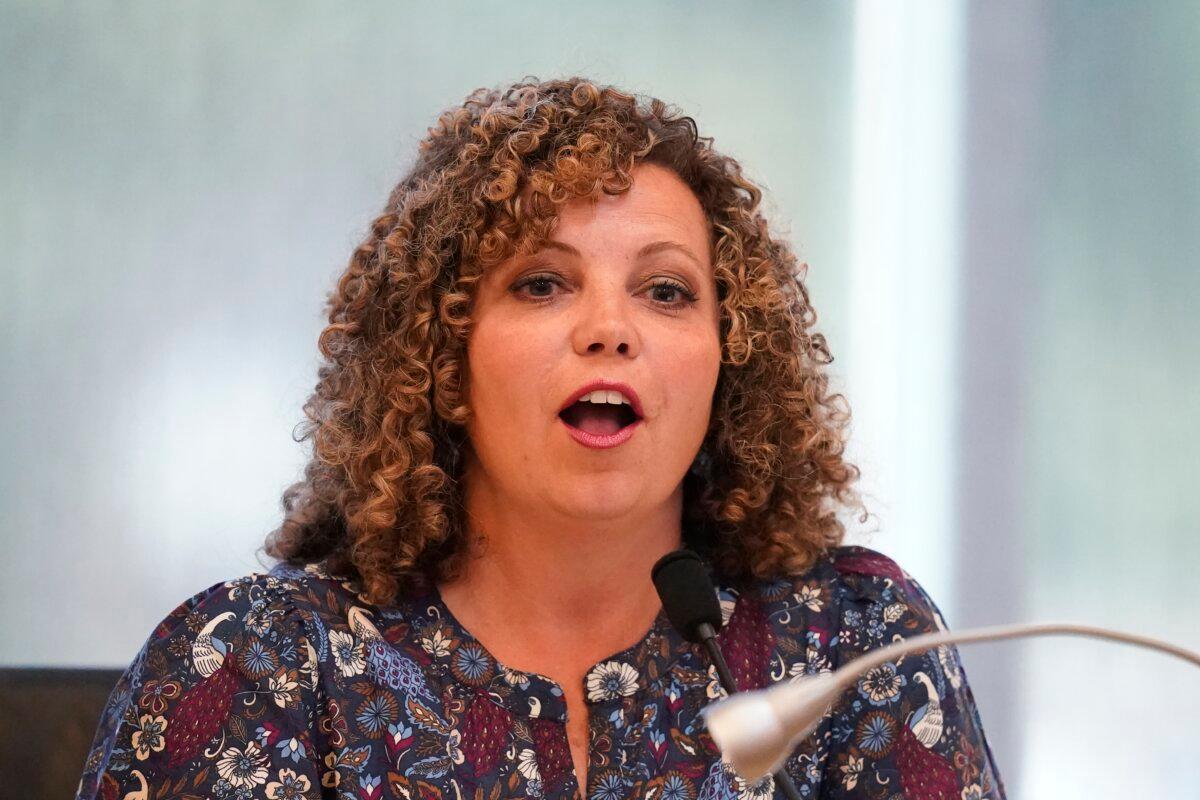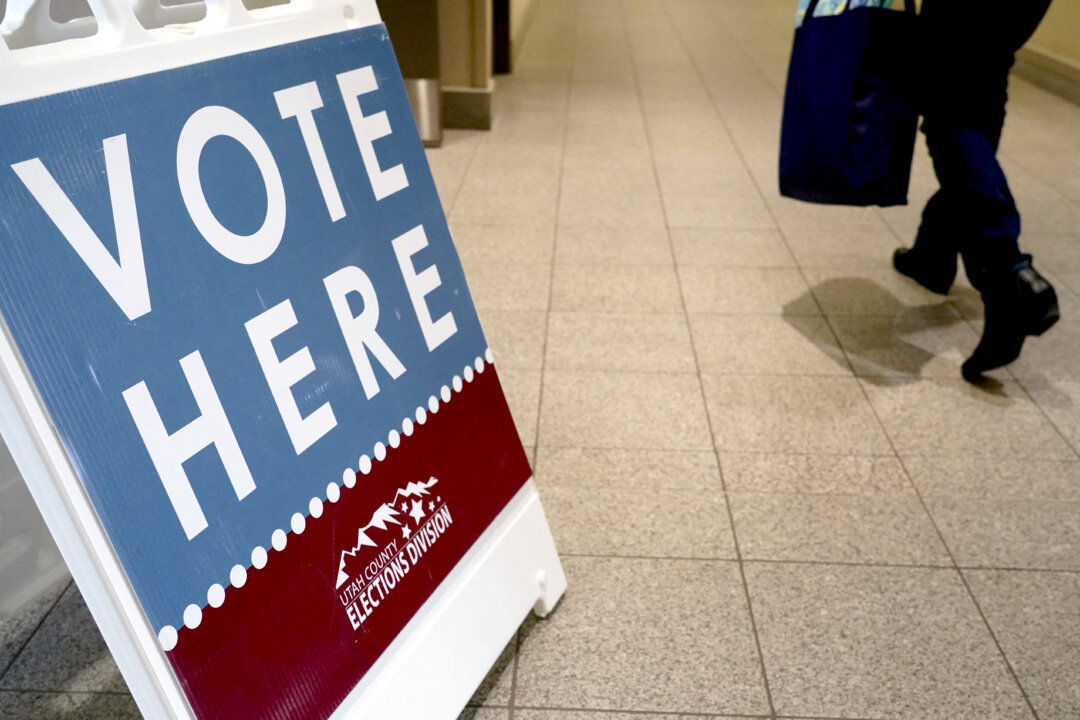Trump-endorsed Rep. Celeste Maloy and challenger Colby Jenkins are just 214 votes apart in their too-close-to-call GOP congressional clash.
Rep. Celeste Maloy (R-Utah) and challenger Colby Jenkins appear headed for a recount in their too-close-to-call June 25 Utah Republican congressional primary election.
The first-term incumbent, endorsed by former President Donald Trump, was clinging to a 214-vote lead with 107,282 ballots counted in the state’s Second Congressional District (CD2) contest, according to the latest updated results posted by Utah’s Lieutenant Governor’s Office at 9:15 p.m. local time on July 9.
With less than 0.2 percent separating Ms. Maloy and Mr. Jenkins, the tally would be within the 0.25 percent range necessary under state law to justify a recount, if requested by either campaign.
Utah Lt. Gov. Deidre Henderson said in a July 9 post on social media platform X that it won’t be certain if a recount is necessary until a statewide canvass of the state’s 29 county canvasses is completed by July 22.
However, that’s not the only cliffhanger in CD2, which spans vast swaths of rural southwest Utah, a 13-county desert sprawl of bone-dust canyons and red-faced mesas where county commissioners certified June 25 election results on July 8 and 9 before dispatching them to the state.
As many as 700 ballots from nine CD2 counties, including 415 from Iron County, were disqualified from the final results because they were postmarked on June 25.
Utah, where every voter receives a mail-in ballot, requires that ballots be mailed before Election Day. Ballots postmarked on Election Day are disqualified.
After two days of deliberation, the Iron County Commission voted 2-1 on July 9 to certify its June 25 election results without 415 ballots included, despite testimony and affidavits from voters who said they dropped their ballots into mailboxes between June 20-24 that weren’t postmarked until June 25.
“That’s because all our mail goes to Vegas and back,” Iron County Clerk Jon Whittaker told commissioners on July 8, a “maddening 340-mile journey” to a U.S. Postal Service sorting center outside Las Vegas where all “847 ZIP code” mail from Utah is routed.
As a result, commissioners were faced with a “Schrödinger’s cat” problem, he said.
“We have this situation with quite a number of ballots that came back with postmarks too late,” he said. “The cat is both dead and alive.”
Mr. Whittaker and County Attorney Chad Dotson said they had no doubt that voters angry to learn their ballots had been disqualified were telling the truth, noting they were willing to attest to that in affidavits. Some already provided affidavits.
The commission delayed certification for a day to consult with state elections officials and state lawmakers. Ultimately, on July 9, it agreed in a 2–1 vote to certify the results without the 415 “late” ballots.
Commissioner Paul Cozzens cast the dissenting vote.
“In matters like these, what is legal isn’t always right,” Mr. Cozzens said. “Today, it’s more crucial to send a message that elections matter and every vote counts, rather than simply rubber-stamping a flawed process. Therefore, I cannot in good conscience certify this election.”
Commissioner Mike Bleak and Sheriff Ken Carpenter, seated in place of an absent commissioner, said state officials advised certification because not doing so could invalidate the 9,384 ballots that were counted.
“As much heartache as it gives me to see 400 ballots that I think were legitimately cast” disqualified, Mr. Carpenter said, “we don’t have the hard, fast evidence to support counting them. In order to protect the sanctity of the vote in our county, I believe we have to approve this canvass.”

But the disqualification of the “Iron County 415,” and as many as 300 of June 25 Las Vegas-postmarked ballots from other “847 ZIP code” counties in southwest Utah, may be reconsidered, as Ms. Henderson hinted in her X statement.
If a recount is ordered after the July 22 statewide canvass, “all uncounted ballots will be reexamined,” she wrote.
Ms. Maloy is more likely to benefit most if those Iron County ballots are included. She was leading Mr. Jenkins by 7 percentage points (5,187 votes to 4,508 votes) in the county, according to results posted by the state’s Lieutenant Governor’s Office.
In a July 9 video call with reporters from Washington County, Ms. Maloy said she doesn’t “anticipate that a recount will change the outcome” of a race she’s won.
Mr. Jenkins praised Mr. Cozzens for his dissent and said he’d press for a recount.
“With the race being so close and there still being outstanding balloting issues that need [to be] addressed, such as the late-postmarking from the ‘Vegas Cancellations’ that have come from our stronghold, the campaign has elected to ask for a recount when the time comes,” he said in a July 10 X post.
Mr. Jenkins said nearly 1,200 ballots were disqualified in Washington County. On July 5, Utah Fifth District Judge Jay Winward rejected his campaign’s lawsuit demanding Washington County Clerk/Auditor Ryan Sullivan turn over a list of voters whose ballots need to be “cured.”
Curing requires election officials to contact individual voters and verify their ballot because their signature didn’t match the one that was previously on file.
“My opponent may have prematurely declared victory last night, but as a combat veteran and having fought battles in my life, I’ve learned firsthand that victory is not something you declare,” he said. “You win it, or you don’t.”
The Utah GOP CD2 Maloy–Jenkins contest, among the nation’s most closely-watched races between an incumbent and a party rival, remains the only undecided contest on the June 25 primary slate.
Ms. Maloy, a land-use attorney, was narrowly elected to the House in a November 2023 special election following Rep. Chris Stewart’s (R-Utah) resignation. Mr. Jenkins is a West Point graduate, former Green Beret combat veteran, and Google executive.
The winner will be the overwhelming favorite in November to roll past Nathaniel Woodward, a Democrat, the Constitution Party’s Cassie Easley, and unaffiliated Tyler Murset.
In Utah’s CD3, state Sen. Mike Kennedy, a physician and attorney, dominated a five-candidate scrum to secure the party’s November berth for the House seat being vacated by Rep. John Curtis (R-Utah), who won his June 25 GOP U.S. Senate primary race to succeed the retiring Sen. Mitt Romney (R-Utah).
Mr. Kennedy will face former Summit County councilman and Vietnam veteran Glenn Wright, who Mr. Curtis defeated with 66.5 percent of the vote in 2022. A Democrat hasn’t been elected in CD3 since 1996.
Two-term incumbent Rep. Blake Moore (R-Utah) brushed off a nominal challenge from electrician Paul Miller in his CD 1 primary.
Mr. Moore is projected to secure a third House stint in this fall’s election against accountant Bill Campbell, a GOP 2022 CD1 candidate running as a Democrat, and Libertarian Daniel Cottam, a surgeon and 2020 gubernatorial candidate.
In CD4, two-term Rep. Burgess Owens (R-Utah) didn’t face a primary contender. The district’s November slate is set with Katrina Fallick-Wang, a Democrat, and the United Utah Party’s Vaughn Cook as heavy underdogs.

